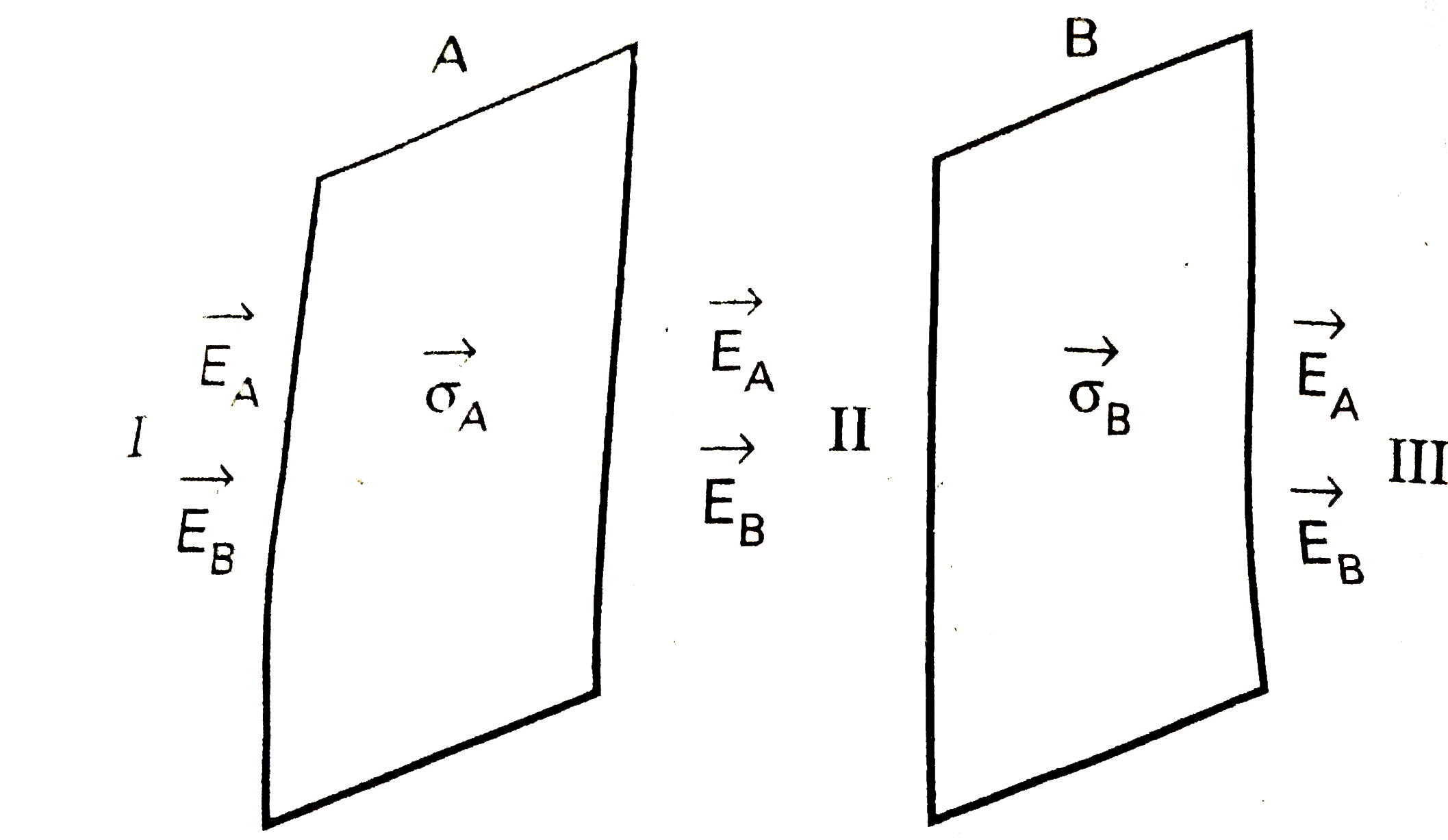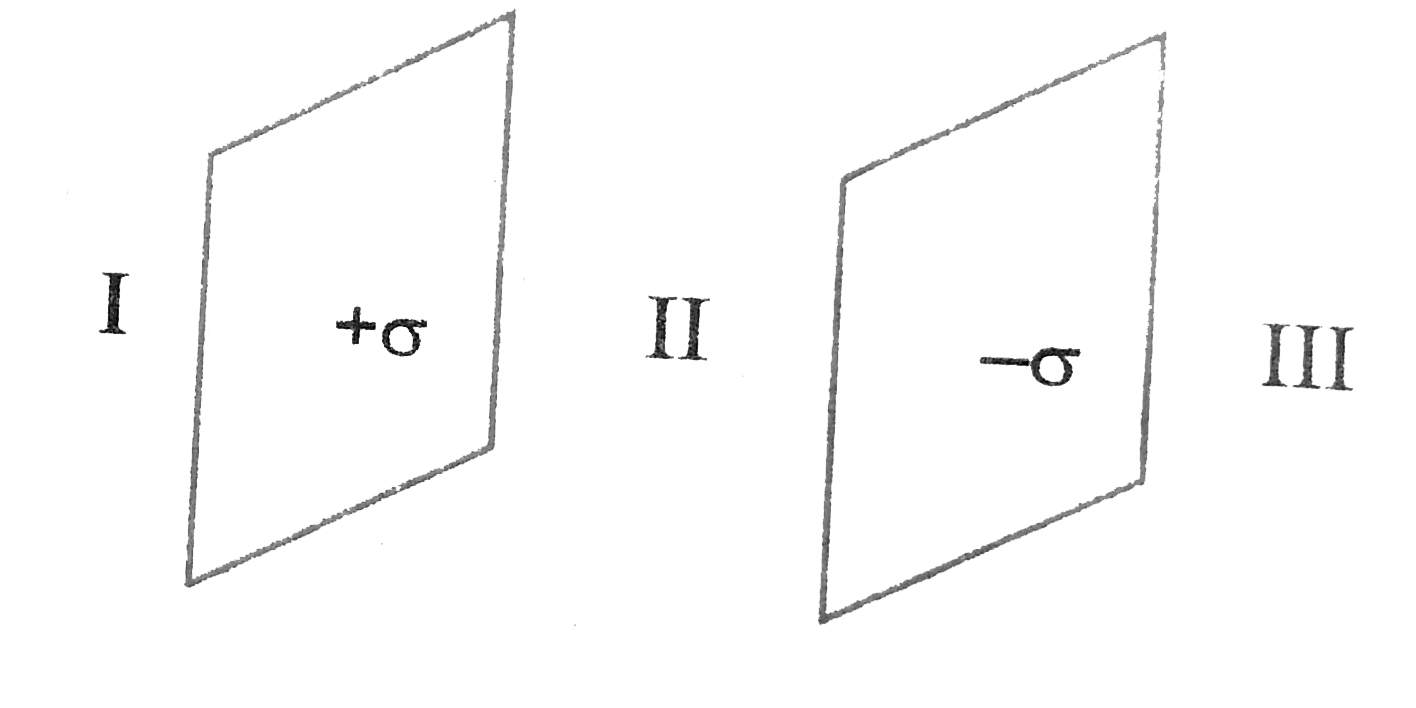Two large, thin metal plates are parallel and close to each other. On their inner faces, the plates have surface charge densities of opposite signs and of magnitude 17.0×10−22C/m2. What is E : in the outer region of the first plate, Solution in Telugu
Given σA=127.0×10−22C/m2
σB=17.0×10−22C/m2
There are 3 regions
(1) Region (I) is the outer region of first plate
(2) Region (II) is the region between the plates.
(3) region (III) is the outer region of the second plate.

EIII=EA+EB=σ−2ε0+[−σ2ε0]=0
Topper's Solved these Questions
- ELECTRIC CHARGES AND FIELDSBOOK - VIKRAM PUBLICATION ( ANDHRA PUBLICATION)CHAPTER - ELECTRIC CHARGES AND FIELDSEXERCISE - DAM SURE VSAQ
17 Videos
- ELECTRIC CHARGES AND FIELDSBOOK - VIKRAM PUBLICATION ( ANDHRA PUBLICATION)CHAPTER - ELECTRIC CHARGES AND FIELDSEXERCISE - DAM SURE LAQ
1 Videos
- ELECTRIC CHARGES AND FIELDSBOOK - VIKRAM PUBLICATION ( ANDHRA PUBLICATION)CHAPTER - ELECTRIC CHARGES AND FIELDSEXERCISE - TEXTUAL EXERCISES
11 Videos
- DUAL NATURE OF RADIATION AND MATTERBOOK - VIKRAM PUBLICATION ( ANDHRA PUBLICATION)CHAPTER - DUAL NATURE OF RADIATION AND MATTEREXERCISE - DAM SURE (VSAQ)
2 Videos
- ELECTROMAGNETIC INDUCTION BOOK - VIKRAM PUBLICATION ( ANDHRA PUBLICATION)CHAPTER - ELECTROMAGNETIC INDUCTION EXERCISE - Additional EXERCISES
15 Videos
Similar Questions
What is meant by the statement 'charge is quantized' ?
View SolutionState Gauss's law in electrostatics. Applying Gauss's law derive the expression for electric intensity due to an infinite plane sheet of charge.
View SolutionTwo small identical balls, each of mass 0.20 g, carry identical charges and are suspended by two threads of equal lengths. The balls position themselves at equilibirum such that the angle between the threads is 60∘. If the distance between the balls is 0.5 m, find the charge on each ball.
View SolutionThe wavelength of electromagnetic radiation is doubled. What will happen to the energy of the photons of the new radiation ?
View SolutionSuppose the loop in Textual Exercise 4 is stationary but the current feeding the electromagnet that produces the magnetic field is gradually reduced so that the field decreases from its initial value of 0.3 T at the rate of 0.02Ts−1 .If the cut is joined and the loop has a resistance of 1.6Ω how much power is dissipated by the loop as heat ? What is the source of this power ?
View SolutionTwo large this metal plates are parallel and close to each other. On their inner faces, the plates have surface charge densities of opposite signs and magnitude 17.0×10−22C/m2. What is →E : in the outer region of the first plate. (b) in the outer region of the secound plate, and (c) between the plates ? See Fig.

View Solutionदो बड़ी, पतली धातु की प्लेटें एक-दूसरे के समांतर एवं निकट हैं। इसके भीतरी फलकों पर, प्लेटों के पृष्ठीय आवेश घनत्वों के चिन्ह विपरीत हैं तथा इनका परिमाण 17.0×10−22C/m2 है। पहली प्लेट के बाह्य क्षेत्र में कुल विद्युत क्षेत्र का का परिमाण क्या होगा ?
View SolutionTwo large, thin metal plates are parallel and close to each other. On their inner faces, the plates have surface charge densities of opposite signs and of magnitude 17.0xx10^(-22) C//m^(2) . What is E : in the outer region of the first plate,
View SolutionTwo large, thin metal plates are parallel and close to each other. On their inner faces, the plates have surface charge densities of opposite signs and of magnitude 17.0×10−22C/m2. What is E : between the plates?
View SolutionTwo large, thin metal plates are parallel and close to each other. On their inner faces, the plates have surface charge densities of opposite signs and magnitude 17.0×10−22Cm−2. What is the electric field
a. in the outer region of the first and the second plates?
b. between the plates?
View SolutionTwo large, thin metal plates are parallel and close to each other. On their inner faces, the plates have surface charge densities of opposite sign and of magnitude 17.0×10−11C/m2. What is E
(a) in the outer region of the first plate,
(b) in the outer region of the second plate, and (c) between the plates?
View SolutionTwo large thin metal plates are parallel and close to each other on their inner faces the plates have surface charges densites of opposite region of the first plate (b) in the outer region of the second plate and (c ) between the plates
View SolutionTwo large thin metal plates are parallel and close to each other on their inner faces the plates have surface charges densites of opposite region of the first plate (b) in the outer region of the second plate and (c ) between the plates
View SolutionTwo large, thin metal plates are parallel and close to each other. On their inner faces, the plates have surface charge densities of opposite signs and magnitude 17.0×10−22Cm−2. What is the electric field
a. in the outer region of the first and the second plates?
b. between the plates?
View SolutionTwo large this metal plates are parallel and close to each other. On their inner faces, the plates have surface charge densities of opposite signs and magnitude 17.0×10−22C/m2. What is →E : (a) In the outer region of the first plate. (b) In the outer region of the secound plate, and (c) Between the plates ? See Fig.

View SolutionTwo large, thin metal plates are parallel and close to each other , On their inner faces, the plates have surface charges densities of opposite signs and of magnitude 17.0×10−22C/m2.What is →E :
in the outer region of the first plate,
(b) in the outer region of the second plate,
(c) between the plates?
View Solution
